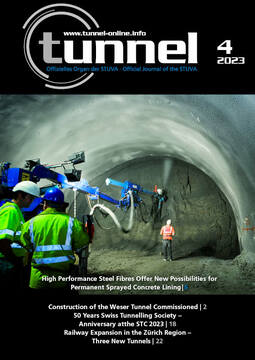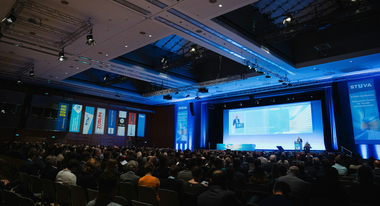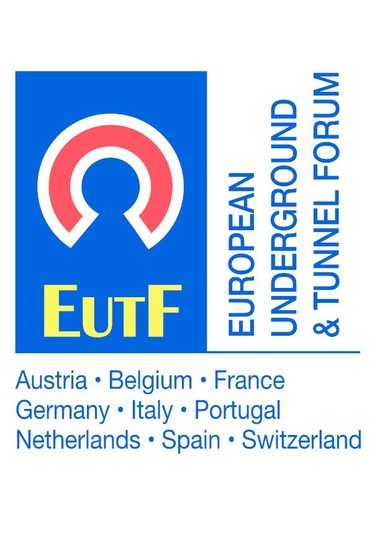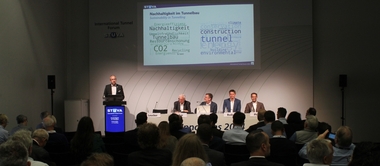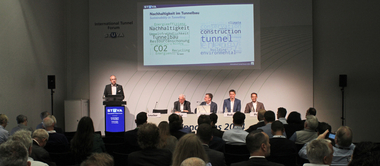DAUB Anniversary: 50 Years of Remarkable Achievements
For five decades, the German Tunnelling Committee DAUB has been promoting underground construction in all its aspects. Themed “50 years of DAUB – a hidden champion invites you”, the association had organized a celebration with a joint dinner. On May 10, 2023, DAUB Chairman Dr. Klaus Rieker welcomed around 80 guests in Bonn, the city where the DAUB was founded.
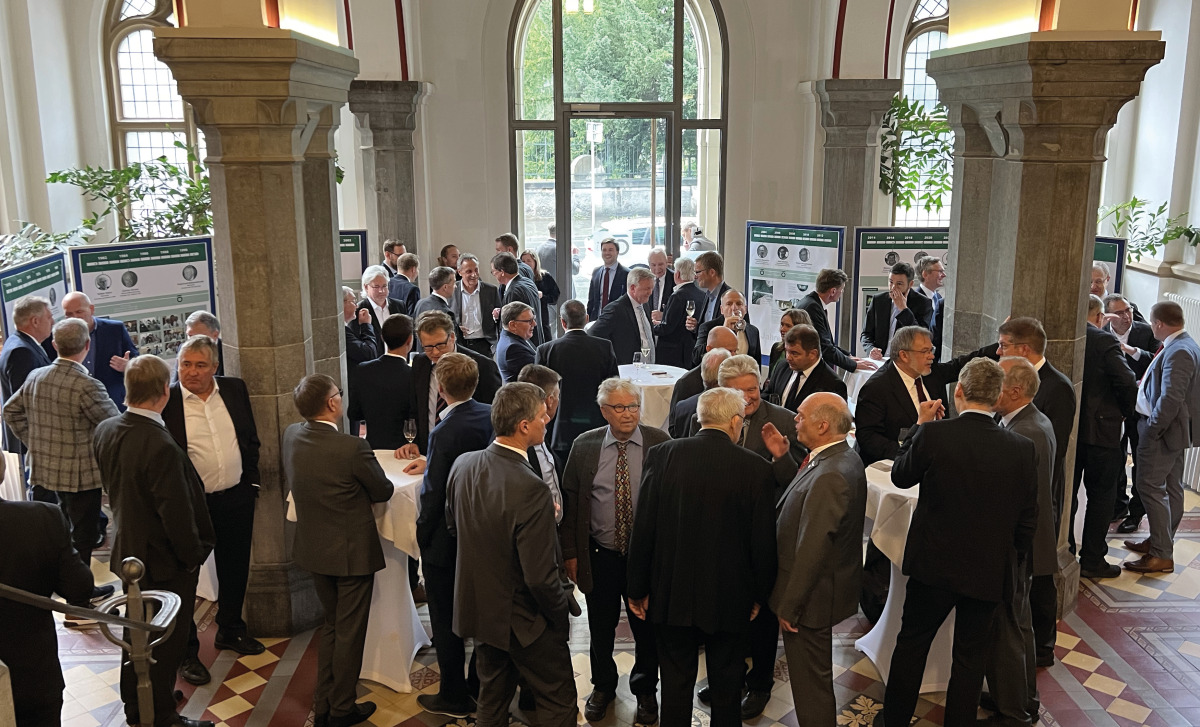 Great location for an outstanding celebration: Champagne reception of the DAUB (German Tunnelling Committee) in the foyer of the Collegium Leonium in Bonn
Great location for an outstanding celebration: Champagne reception of the DAUB (German Tunnelling Committee) in the foyer of the Collegium Leonium in Bonn
Credit/Quelle: Götz Vollmann
In his welcoming address, Rieker – also responsible for major projects at Wayss & Freytag – first reminded attendees of the history of the DAUB‘s origins. As early as 1970, the OECD (Organization for Economic Co-operation and Development) had noted that the construction of traffic tunnels was increasing rapidly worldwide and therefore decided to promote international co-operation in tunnel construction and the development of urgently needed common rules. It recommended that member nations create a central body for tunnel construction in their own countries, thus facilitating productive international cooperation. This was the trigger for the foundation of the DAUB, which held its constituent first meeting in Bonn in December 1972.
Since then, the DAUB has been collecting and disseminating technical information on underground construction and collaborating nationally and internationally in drawing up laws, standards, guidelines and safety regulations. The DAUB does all this very successfully, but rather in the background than on the big political stage. Visible results of its work are above all the DAUB recommendations on technology, safety and contracting, of which 34 have since been published and can be downloaded free of charge from the DAUB homepage. In the last three years alone, recommendations have been published on topics as diverse as BIM, project risk management, life cycle assessment, selection of tunnel boring machines, and a guide to health and safety at underground construction sites. DAUB recommendations are considered the rule of technology throughout the industry and are accepted and used by authorities and clients, the scientific and planning communities, and industry alike. This is partly due to the structure of the DAUB, as all stakeholders – public authorities and clients, researchers and the construction industry – are equally represented in the DAUB.
Looking Ahead: Mobility and Climate Protection
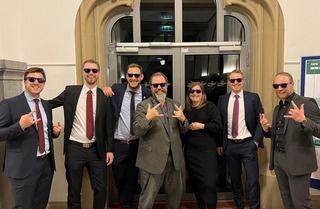 The young tunnellers were also invited: The STUVA-YEP Steering Committee posed in high spirits as “Backfill Boys” together with Arnold Dix (from left: Ruben Deckers, Nils Gramlich, Christian Rhein, Arnold Dix, Anna Zehlicke, Christoph Caspari, Robert Lutz) ...
The young tunnellers were also invited: The STUVA-YEP Steering Committee posed in high spirits as “Backfill Boys” together with Arnold Dix (from left: Ruben Deckers, Nils Gramlich, Christian Rhein, Arnold Dix, Anna Zehlicke, Christoph Caspari, Robert Lutz) ...
Credit/Quelle: Götz Vollmann
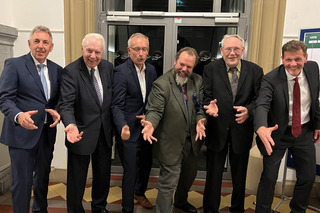 ... and the “Old School Band” responded accordingly
... and the “Old School Band” responded accordingly
(from left to right): DAUB Chairman Dr. Klaus Rieker,
Prof. Dr.-Ing. Günter Girnau, Lars Babendererde,
ITA President Arnold Dix, Prof. Dr.-Ing. Alfred Haack,
Prof. Markus Thewes)
Credit/Quelle: Götz Vollmann
Concluding his introductory speech, Klaus Rieker reminded the guests that the celebration was not only to look back, but rather to look ahead. In order to maintain mobility, the DAUB chairman said, intensive efforts would also be needed in the future to expand and maintain existing infrastructures. After all, well-planned tunnels avoid traffic jams, reduce travel distances and thus make a sustainable contribution to climate protection. Underground structures will continue to play key roles in climate change mitigation, Rieker pointed out with certainty: „”Underground structures can contribute to safe water and power supply, serve as reservoirs for exceptional rainfall events, and enable functioning wastewater drainage.”
This was followed by the first of two “impulse speakers” already announced in advance. Acting ITA President Arnold Dix has dedicated his presidency, which is only a few months old, entirely to the topic of sustainability. “We have a clear task for the coming years,” Arnold Dix greeted the festive congregation present. “Ensuring health, prosperity, quality of life, well-being and safety for all people and our planet: To do this, we the tunnelling industry must also meet the challenges of the climate emergency and significantly reduce our industry‘s own carbon footprint. For example, we as the ITA must support the concrete and cement industries in developing low-emission construction solutions and promote innovation in the design, construction, operation and rehabilitation of underground infrastructure.”
Efficient High-Speed Lines – Only With Tunnels
Arnold Dix passed the microphone to a no less interesting speaker: Dr. Philipp Nagl, who has been elected Chairman of the Management Board of DB Netz AG since August 2022, and is responsible for infrastructure, informed the guests about DB‘s current plans. He also brings experience from Austria, as Philipp Nagl was Head of Business Development for Passenger Transport at Austrian Federal Railways (ÖBB) from 2011 to 2014. He is convinced that fast, reliable and also environmentally friendly rail transport can only succeed by increasing the tunnel proportion.
In his speech, he went far back in the history of railroad construction and recalled the construction of the Semmering Railway in 1848, which was opened as the first standard-gauge mountain railroad in Europe in 1854. For a straight line of 21 km, a line of 42 km was built at that time. Nowadays, Nagl said, efficient high-speed lines are necessary – especially in the Trans-European Railway Network – which are inconceivable without tunnels. As an example, he cited the 512 km long German Unity Transport Project No. 8, which has a tunnel share of 29% and, for example, allows a traveling speed of up to 300 km/h in the Masserberg Tunnel, which is over 1 kilometer long.
Tunnel Enthusiasm of the Seventies
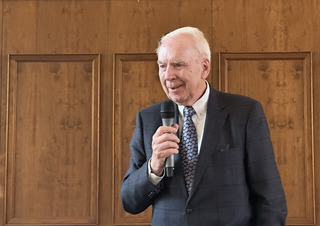 Prof. Dr.-Ing. Günter Girnau during his speech for the DAUB, which he himself co-founded 50 years ago ...
Prof. Dr.-Ing. Günter Girnau during his speech for the DAUB, which he himself co-founded 50 years ago ...
Credit/Quelle: STUVA
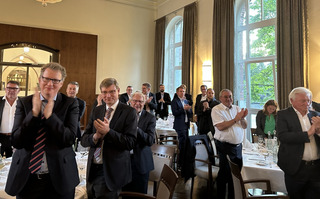 ... and subsequent standing ovation for one of the great personalities of the tunnelling community
... and subsequent standing ovation for one of the great personalities of the tunnelling community
Credit/Quelle: STUVA
With that, the speeches of the two „impulse speakers“ were finished and DAUB Chair Rieker summoned the guests to the joint dinner. After the starter, a very special surprise guest took the microphone. The now 88-year-old Prof. Dr.-Ing. e. h. Günter Girnau, founding father of the DAUB, himself former ITA President and for decades Managing Director and Chairman of the Board of STUVA, took all guests back to the early years of the DAUB, and thus to the general enthusiasm for tunnels at the beginning of the 1970s, with a captivating, free speech: “In my time, the attitude towards tunnel construction was quite different from today – both among those who carried out the work and among the citizens. Traffic tunnels were being built in no fewer than 17 German cities at the same time. Whoever could present a reasonably sensible plan and shouted ‚Here!‘ the loudest got the contract.”
Girnau does not appreciate the fact that today tunnel opponents want to prevent the construction of tunnels because of the CO2 emissions during construction: “We wanted to give the surface in the cities back to the citizens as much as possible – for pedestrian zones, parks and residential development, but without completely displacing the car, because that would damage the urban economy. That is precisely why we tried to shift the city‘s traffic development as far as possible to the underground level. To do this, we built tunnels, and we came to the conclusion that if electrically powered trains then travel through these tunnels for over 100 years, completely free of exhaust fumes, and transport hundreds of thousands of people every day (all of whom give up their cars), then this is not only environmentally friendly, but also climate protection.”
Great Future Prospects
In any case, all the guests were certain that a great future lies ahead for tunnel construction, which will be increasingly environmentally friendly in the future. And the DAUB will not run out of important topics any time soon. With this in mind: Happy 50th birthday, dear DAUB!

